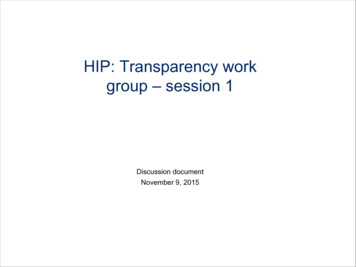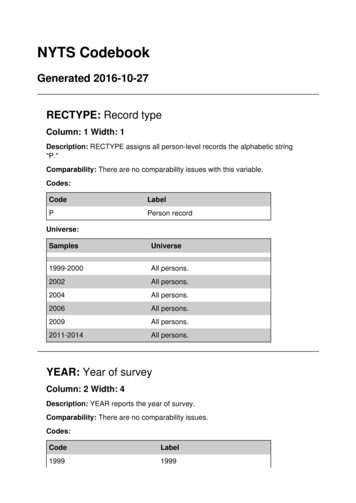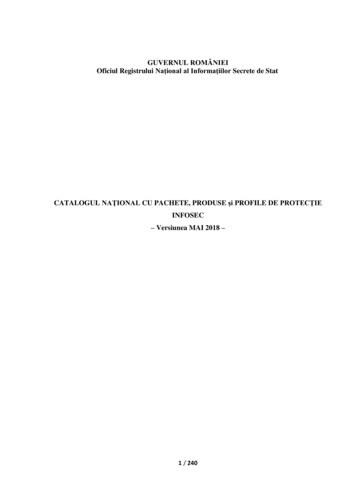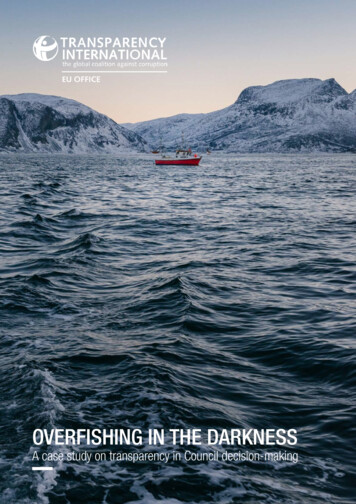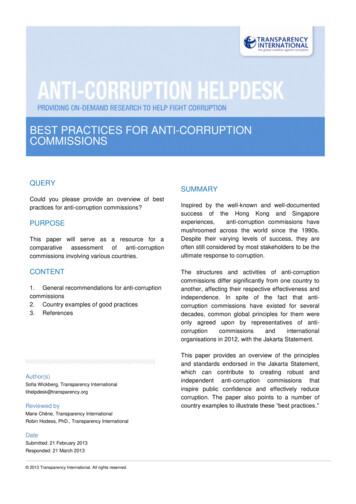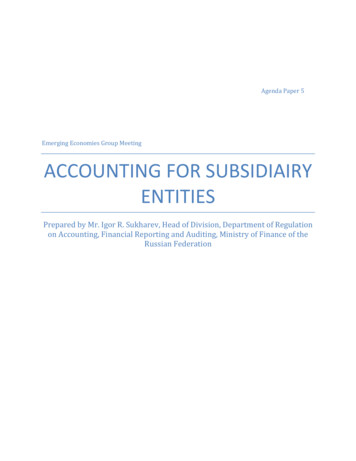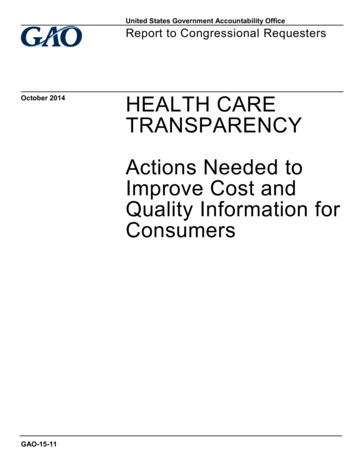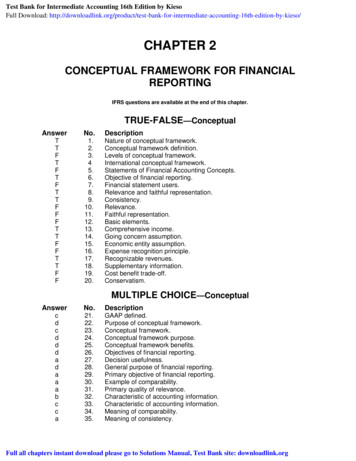
Transcription
Agency for QualityAssurance throughthe Accreditation ofStudy ProgrammesAgency for Quality Assurance through the Accreditation of Study ProgrammesQualityTransparencyComparabilityFinal ReportLessons LearnedInternational Accreditation Proceduresfor Study Programmes in Moldova
LESSONS LEARNED FROM THE INTERNATIONAL ACCREDITATIONPROCEDURES FOR STUDY PROGRAMMES IN MOLDOVAR ECOMMENDATIONS FOR THE M OLDOVANM OLDOVAN UNIVERSITIES AND ANACIPM INISTRYOFE DUCATION ,THEDoris Herrmann and Dr. Katarina Löbel1.THE PROCEDUREBackground and motivationThe German accreditation agency AQAS, Agency for Quality Assurance throughAccreditation of Study Programmes, was partner in the TEMPUS project “QUAEM”(Development of Quality Assurance in Higher Education in Moldova) since the start ofthe project in 2012. AQAS is an independent non-profit organisation, supported bymore than 85 member institutions, both Higher Education Institutions (HEIs) andacademic associations. Since 2002, the agency has been accredited by the GermanAccreditation Council (GAC). It is therefore a notified body for accreditation of HigherEducation Institutions and programmes in Germany. The activities of AQAS inaccreditation are neither restrained to specific academic disciplines or degrees nor toa certain type of Higher Education Institution. AQAS is a full member of the EuropeanAssociation for Quality Assurance in Higher Education (ENQA) and also listed inthe European Quality Assurance Register for Higher Education (EQAR) whichconfirms that our procedures comply with a common set of principles for qualityassurance in Europe.The TEMPUS project has the target to implement internal and external mechanismsfor quality management in the Higher Education system in Moldova. Within theTEMPUS project the accreditation of some programmes was planned. The purpose ofthese accreditations was to test whether the instruments, which had been developedwithin the project, would work in a country with little experience with this form ofexternal quality assurance. Universities had to apply to become part of thisinternational accreditation procedure. A selection process took place to identifyprogrammes that could be used for this and in the end four programmes from differentdisciplines at different universities were selected from among 18 proposals:Mathematics and Informatics at TSU and at UBS, History at MSU andElectromechanics at TUM. The Ministry of Education of the Republic of Moldovapromised to recognise the accreditation decision by AQAS as a national accreditation.1
After the selection process it became obvious that an international accreditation wouldalso be an important procedure to improve quality of the programmes which haven’tbeen selected. Therefore the Ministry of Education decided that 11 study programmesshould undergo a programme accreditation by AQAS in a separate procedure outsidethe TEMPUS project (see Appendix 1, Timeline).The elected study programmesIn total, the following eleven study programmes underwent the review: from Technical University of Moldova (TUM): “Geodesy, topography andcartography” (B.Sc.) and “Textiles and Leathers Products Engineering” (B.Eng.), from Moldova State University (MSU): “Chemistry” (B.Sc.) and “Finance andBanking” (B.A.), from Tiraspol State University (TSU): “Biology and Chemistry” (B.Sc.) and“Pedagogy of Primary and Preschool Education” (B.Ed.), from “Bogdan Petriceicu Hasdeu” Cahul State University (SUC): “Romanianand French Language and Literature” (B.Ed.), “History” (B.A.) and “PoliticalScience” (B.A.), and from Alecu Russo Bălţi State University (USB): “Romanian Language andLiterature and English Language” (B.Ed.) and “Pedagogy in primary education andPre-school pedagogy” (B.Ed.).The stages of the procedure and criteria for the reviewsBased upon the European Standards and Guidelines (ESG), developed by theEuropean Association for Quality Assurance in Higher Education (ENQA) andpresented to the Bologna Follow-Up group in 2005, AQAS has developed criteria forprogramme accreditation in phase one of the TEMPUS project and this set of criteriawas discussed between the Ministry of Education of the Republic of Moldova, theUniversities of the consortium and AQAS. In the end every partner could agree on ajoint set of criteria and indicators that would reflect the particular situation in Moldova,but at the same time meet the requirements resulting from the ESG.Based on these criteria AQAS developed guidelines which were used by theuniversities to provide an application for accreditation: a Self Evaluation Report (SER)of 30 pages plus appendices (e.g. module descriptions, examination regulations,data). AQAS checked if the drafts of these applications were compliant to theguidelines and criteria and gave feedback to the universities.All accreditation procedures were officially initialised by a decision of AQASAccreditation Commission. The Accreditation Commission then nominated an expert2
panel for each procedure and the university had the right to raise concerns against thecomposition of the panel.The university handed in the final version of the SER which was then sent to theexperts. AQAS asked the experts to write a short preliminary statement aboutstrengths and weaknesses of the respective study programme and these statementswere exchanged between the experts and sent to the university to prepare thediscussions during the site visit.Each site visit lasted at least two days for each programme (see Appendix 2,Schedule). On site, the experts interviewed different stakeholders (e.g. management,professors, students, representatives of the labour market) and consulted additionaldocumentation and student work. The visits concluded with the feedback on thepreliminary findings by the panel of experts to the university representatives.The panel of expertsStakeholder involvement is seen as one of the major principles by all Europeanassociations or institutions (ENQA, EQAR, ECA) dealing with quality assurance inHigher Education. Therefore, all panels of experts, which worked for AQAS inMoldova, included professors from the discipline under review as well asrepresentatives from the labour market and a student member. The panels or expertshave been nominated by the Accreditation Commission of AQAS. It was the target ofthe agency to have a mixed composition of experts from Germany, Romania andother European countries to assure both the international perspective as well as asufficient understanding of the Moldovan context.All reviews based on the criteria that had been developed jointly as part of a TEMPUSproject. AQAS prepared the panel of experts for its tasks in Moldova with materialrelated to the procedure (e.g. guidelines, criteria and information on the HigherEducation system in Moldova in general), with documentation on the respectiveprogramme, e.g. the Self-Evaluation Report, and with information on the site visit, e.g.the schedule. Before the particular site visit took place, AQAS arranged an internalmeeting of the panel of experts to brief them on the procedure and the criteria as wellas to discuss the strengths and weaknesses of the corresponding programme. Basedon the discussion, AQAS prepared a list of questions for each meeting during the sitevisit. AQAS also supported the experts during the site visit by taking notes andmoderating the discussions with the representatives of the universities.Finalisation of the accreditation procedureAfter the site visit, the panel of experts drafted the report with the evaluation of therespective study programme which was afterwards sent to the university to givecomment on the report. Both, the report of the experts and the comment of the3
university, were sent to the Accreditation Commission of AQAS to take a finaldecision.In general, the Accreditation Commission has four options for decision: accreditation without conditions, accreditation with conditions, the postponement of the decision, or the denial of the accreditation.In one case, an accreditation without conditions was given for the duration of fiveyears. In two cases, the decision was postponed since severe shortcomings werestated which needed to be remedied before the decision for accreditation. In the othereight cases, an accreditation with conditions was given for the duration of five years.According to the regulations, the accreditation is valid from the day when theAccreditation Commission has taken the decision. To keep the accreditation, theconditions have to be fulfilled by the university within nine months and the fulfilmenthas to be reported to AQAS. The universities were given a specific date until whichthey have to hand in documents which give evidence of the fulfilment of theconditions.According to the European regulations, AQAS published the results of theaccreditation procedure on its website. While AQAS’ accreditation is already validinternationally, legal rights only come with the recognition by the national Ministry. TheMinistry of Education of Moldova promised to approve also the accreditation resultsand to recognise the outcomes of the procedure as a national accreditation. Aninternational accreditation can also be mentioned in the Diploma Supplement whichcan be helpful for the students if they apply to enter study programmes in the Bolognaregion.2.OBSERVATIONS FROM THE ACCREDITATIONSGeneral remarksThe most obvious result is of course that nine out of these eleven study programmessuccessfully went through the accreditation procedure and were grantedinternational accreditation by AQAS. Two study programmes did not yet comply withall Standards for Quality Assurance in the European Higher Education Area (ESG)and the European Qualifications Framework (EQF) in the 2005 version. However, it islikely that the shortcomings can be remedied within 18 months, so that theAccreditation Commission of AQAS postponed the decision.4
All participants from the partner universities in Moldova showed that they aremotivated to work on their programmes and internal management of their universities.It became obvious that international accreditation was seen as an opportunity forimprovement. An external QA procedure has the same impact in every country:universities are forced to reflect what they are doing. Usually a good universityimplements changes already before the panel of experts visits it. This positiveattitude was crucial for the success of the project which required a commitment fromall stakeholders to implement changes in the universities in Moldova. Overall, theAQAS team who was involved in the site visits had the positive impression that mostof the staff members of the universities were open to discuss critical aspects with theircolleagues from abroad and to accept the proposed recommendations. In addition,the site visits were organised very professionally by the universities.The Ministry of Education in Moldova was open-minded regarding the accreditationprocedures and it was willing to accept the results independent of what theoutcomes are. Such a “sportive” view on accreditation procedures cannot be found inevery country which strives for international accreditation.Socio-political remarksDuring the procedures, the experts and AQAS learned about the specificities of theMoldovan situation in Higher Education. They learned that many of the Moldovanyoung people go abroad for their studies, especially to Romania, since they getscholarships and other forms of support and they consider a degree from a universityabroad as more prestigious. This means for the Moldovan universities a hardcompetition for students and for the Moldovan society a brain drain in manybranches. Therefore, the representatives from the universities were partly doubtfulwith respect to internationalisation because this might contribute to worsen thissituation. On the other hand, internationalisation was considered to be crucial to keepup with other European universities, thereby offering a vision to young people to stayin Moldova or to young people from other countries to come to Moldova.Another aspect, that was specific for Moldova, was the role and status of teachereducation. To work as a teacher seems to have a low reputation. Due to the lowstatus and since teachers have a very low salary, many students decide against thesestudies. Teachers, however, have a crucial function in societies for the upbringing ofthe future generation. Therefore it is important for the development of a country togain the best of the graduates to become teachers at the public schools and to buildup an attractive career path for them.In addition, it became apparent that also the salary of the professors who teach atthe universities is, compared to other countries, low. For that reason, many professorshave more than one job. In addition, the teaching load at one institution is high5
compared to Western European countries. This leads to a situation in which theprofessors spend their time teaching and have nearly no time left for doing research.A core feature of the European accreditation procedure is the stakeholder principle,e.g. students should have an active role in the process of quality assurance. It wasvery helpful to have students from Germany or other European countries included inthe panel of experts. The experiences with the students from the universities inMoldova, who discussed the strengths and weaknesses of their programmes with thepanel of experts, were mixed. Some students were open and active while others wereshy. In order to benefit most from the student perspective, universities shouldencourage their students to play a more active role in internal and external qualityassurance procedures.Procedural remarksOn the methodological level, AQAS recognised that trust in the instruments of externalquality assurance, particularly accreditation, was generated in the course of theTEMPUS project. All persons involved in the accreditation procedures becamefamiliar with these instruments and how to use them. Thus, the aspect ofprofessionalism was also strengthened during the procedures. From the perspectiveof AQAS, both points are a highly valuable outcome since it is always difficult “tocome from paper to action”.However, some issues could be observed during the procedures which should beaddressed by the new agency ANACIP in further external quality procedures.All universities lacked experience in writing applications and Self-Evaluationreports. Most often, the universities described their programmes on a mere formallevel by stating that national regulations are fulfilled. Experts, on the other side, needinformation on how things are done, with what aim and with what success and howprocesses have been developed by the university. This “self-evaluation”aspect wasmissing in nearly all application reports.The presentation of the universities’ representatives during the site visits differed.Some representatives presented themselves in a professional way and discussedtheir programmes in a constructive manner. Others were more evasive in theiranswers which caused difficulties for the experts to understand the practices ofteaching and learning and, consequently, caused difficulties in the evaluation.During many site visits the language, respective the interpretation was an issue.Romanian experts were included in all expert panels which was helpful because oftheir better understanding of the situation of Moldovan universities within the HigherEducation system but also because of their knowledge of the language. Due to theirfeedback it became clear that the interpreters often misunderstood the contributionsor that they left aside important aspects. This might be caused by the fact that in many6
cases members of the academic staff from the respective university were in charge ofinterpreting instead of trained interpreters. This problem is specific for internationalprocedures. However, if Moldovan universities wish to apply for further internationalaccreditation procedures, universities should work exclusively with trained interpreterswho are independent from the respective university.Typical conditions and recommendations given to the universitiesThe panels of experts confirmed that in many programmes the quality of teachingand learning is high. They were satisfied with the adaptions to the Bologna processso that the general concepts of the programmes were largely accepted. Most of therecommendations given by the experts to the programmes refer to the particularsituation of the specific programme so that they cannot be generalised (e.g.implementation of new modules, integration of internships, activating learningmethods, reduction of the number of exams). On the other hand, some issues were ofa more general character.In many procedures, the experts criticised the descriptions of the intendedqualification goals of the programmes. In some cases, a description of the goals andlearning outcomes did not exist at all. In cases where such a description existed, itwas most often on a mere formal level oriented to the fulfilment of the requirements bythe Ministry of Education and less oriented to the development of competences. Inmany cases, the Accreditation Commission of AQAS therefore required, that theuniversity must describe the qualification goals in a transparent manner and that thegoals must be described as competences. Furthermore, the definition of targets of theindividual courses and the fundamental idea behind the curricular structure wassometimes difficult to understand. Therefore, several programmes got the condition toprovide completed and updated module descriptions, again including the definition ofthe intended learning outcomes. These module descriptions must also be publiclyavailable. In the European higher education area, the aspect of transparency is ofcrucial importance to raise trust in each others programmes. To support theuniversities in Moldova, AQAS recommended organising a specific workshop oncompetence orientation and on how to formulate the definition of qualification goalsand learning outcomes which took place within the TEMPUS project in Moldova.Another general remark of the panels of experts was that the programmes were solidfrom a scientific point of view but they were, on a content level, in some cases not upto-date compared to the developments in the disciplines in many countries in Europe.That is why in many procedures a condition was given that the university must updatethe curriculum with respect to modern theories and methods. In addition, it isrecommended to define a process how the update of the curriculum is organisedinvolving all stakeholders.7
The internationalisation of most of the study programmes in Moldova should bestrengthened. To study in other European countries, the students need a solidcommand of English which was most often not the case. Moreover, internationalstudents should be attracted to study in Moldova by extending the number of coursestaught in English. Even if there is the risk of brain drain if the students are sent toother countries, international mobility will be crucial for Moldova to connect withEurope. To stress this perspective, in many procedures the experts recommendedthat the faculties should strengthen their efforts towards internationalisation, toincrease the number of courses taught in English and to encourage students to useinternational research literature and international databases.Quality assurance instruments had been developed and implemented in alluniversities before the accreditation procedures took place. The experts evenhighlighted the quality management systems as elaborated. However, in manyprocedures it became clear that the university-wide instruments are hardly applied bythe faculties on the programme level. For that reason, many universities wererequested to develop a concept on how to establish a system for data collection onthe progression of the students, a monitoring system on their workload as well as onthe success of the graduates of the individual programmes. It must be clear andtransparent how the data and the evaluation results are used for the development ofthe individual programme.Furthermore, in some cases the students reported that they filled out questionnairesfrom time to time but that they never got any feedback. Therefore, a condition wasgiven in some cases that the faculty should establish a system for quality assurancewhich is applied to all courses, in which students are included on a regular basis andin which students also know about the results of quality assurance as well as aboutthe countermeasures.The experts noticed in many programmes that the curricula were built up of a highnumber of small courses. The universities often explained that this structure resultedfrom the prescribed content and competence areas defined by the Ministry ofEducation. The experts, on the other hand, think that competence development canbe realised better in bigger educational components e.g. modules. The modulesthen constitute the frame for competence development. This way, both content-relatedcompetences are imparted and transversal skills, e.g. instrumental competences, canbe trained. The Accreditation Commission followed the experts’ perspective andrecommended in many procedures that faculties should merge courses of the samedomain to larger units with a clear denomination. This restructuring would also allowthe Moldovan programmes to be more compliant with the curricular structures of otherEuropean countries as explained in the ECTS Users’ Guide.With respect to the examination concept, the reviews revealed in many cases a highnumber of examinations focussing on limited content units. In this respect, a reflectionof the role of assessment in the progression of students towards the achievement8
of the knowledge and skills associated with their intended qualification is needed.Connected to the discussion about modularisation, the experts favoured a reduction ofthe number of exams. Instead, more comprehensive exams should be applied andmore alternative assessment methods should be included in the programmes withwhich to assess different competences.One aspect, which can be seen as strength and a weakness at the same time, refersto the personal and material resources at the universities in Moldova. The expertsappreciated with high respect what is achieved with little resources by the universities.Nevertheless, the limits set by the resources can also be seen as an obstacle for theteaching and learning process. In the field of Informatics, for example, the lack ofhardware and software at some universities was obvious. To be trained on modernsoftware is crucial for the success of the graduates on the labour market. For thehumanities and social sciences, it is important that more scientific literature in Englishis provided for the students. And in the language programmes, the number of teachingstaff in the foreign language should be increased. The Ministry and each universityshould carefully monitor that all necessary resources are provided.As far as staff resources are concerned, the experts identified more problems. Insome of the programmes, the number of PhD holders is relatively low, in somedisciplines the staff members are relatively old and the teaching load for the academicstaff members is in almost all programmes relatively high. The panels of expertsconcluded that research activities and the connection of teaching and research stillneed to be improved. From a German perspective, teaching at a university is basedon research to train the new generation for future challenges. That is why in somecases, a condition was given that a concept should be provided on how researchactivities of the faculty will be planned and coordinated over the next years and howresearch and teaching are connected. On the other hand it’s not possible to increasethe number of PhD holders on a short term but only in the middle run. The introductionof doctoral programmes can help to strengthen research at universities in Moldova butonly if the outcome of research bears comparison with the scientific level of otherEuropean countries. The aspects of staffing and research should also be discussedon a national level because it is not only in the responsibility of the universities tochange the resource situation.3.COMPARISONS TO THE GERMAN HIGHER EDUCATION SYSTEMIn Germany, universities underwent their first accreditation procedures from 1999onwards. Indeed, the situation was in many aspects similar to the situation of Moldovaat the beginning of the QUAEM project. Universities struggled when defining aconcept for BA/MA programmes, when thinking in goals and competencies and whenwriting the Self-Evaluation-Reports. But in the last 17 years universities developedinternal QA systems and many show a highly professional attitude with respect to9
external quality assurance over time. They professionalised their structures andprocedures for QA on every level of the institution.A comparison between the two Higher Education Systems in Moldova and Germanyis not easy if you compare data. The reason for this is that there are 121 universitiesand 220 universities of applied sciences plus several HEI for arts in Germany.Meanwhile more than 17,700 BA/MA programmes exist and more than 10,000programmes have been accredited in Germany. Therefore competition betweeninstitutions and programmes seems stronger in the German Higher Education systemand the pressure to change rapidly and to adept to new developments is high.With the introduction of BA/MA programmes in Germany universities took the chanceto implement new, interdisciplinary programmes beside the traditional disciplines, e.g.Environmental Sciences, Financial Mathematics or Cultural Studies. This enableduniversities to react to the needs of society and the labour market more precisely. Incomparison programmes offered in Moldova seem more traditional. Of course, in asmall country the number of specialists in Financial Mathematics which is needed maybe low but nevertheless universities should offer more modern (interdisciplinary)knowledge from which society can benefit.The conditions and recommendations given by the Accreditation Commission ofAQAS changed during the last years but there is still a need to give advice forimprovement. An accreditation without condition is rarely given by AQAS: only inapprox. 10 % of the cases. 85% of the programmes are accredited with conditions.Mostly, conditions are fulfilled by the universities in the first period; the accreditation isvery rarely withdrawn by AQAS due to the non-fulfilment of conditions. The other 5 %of the cases are those cases where the decision is postponed for a period ofmaximum 18 months or in which the accreditation was denied. Usually, theuniversities withdraw the application for accreditation before a negative decision hasbeen taken.To contrast the results from the eleven accreditation procedures carried out inMoldova and to put them into greater context, some facts and typical conditions andrecommendations from Germany should be discussed hereinafter.When conditions are given, in the majority of the cases they refer to formal aspectsand to transparency. Indeed, the condition most frequently issued by the AQASAccreditation Commission refers to the need to define the profile of the programmemore precisely and to the module handbook that should be revised. There is still aneed in Germany that the universities should strengthen the description ofcompetencies on programme and module level. Another requirement is to publish theofficial programme documents, in particular the examination regulations so thattransparency and legal certainty is achieved for students. The number of exams isalso an issue that often needs to be corrected in order to improve the feasibility of theprogrammes. In many programmes, the experts furthermore complain that the study10
plan is not comprehensible and needs to be revised. In fewer cases, the requirementsto enter a programme must be defined more clearly.When the accreditation system in Germany started to evaluate the programmes ofdifferent disciplines in 1999 many conditions have been given which refer to thecontent of the curriculum and the BA-/MA-structure in general. In the last years this isnot a major issue at German universities anymore. The universities became familiarhow to conceptualise a Bachelor- or Master-programme and how to structure thecurriculum in modules. From a comparative perspective, it becomes clear that manyof the conditions issued in Moldova are not “typical Moldovan” but typical foruniversities which have little experience with the new BA-/MA-programmes and thecore ideas of Bologna. Many German universities also struggled to describe theirprogrammes in a comprehensible way for external readers.The situation of German universities in general differs from universities in Moldovabecause for several years now the political idea of autonomy allows institutions to takedecisions without the influence of the government. In some of the federal states ofGermany universities decide which programmes they would like to offer, how theconcept of the programme looks like and how the resources are spent. This has, ofcourse, also an impact on the recommendations given in accreditation procedures.German universities are able to implement changes in their disciplines or in thedemands of the labour market much faster. Normally, the programmes are notoutdated.A huge difference between German and Moldovan universities lies in the role ofresearch. All Higher Education Institutions in Germany follow the principle thateducation should be research-based, even in Bachelor programmes. Although theintensity and the quality of research differs between institution and depending on thetype of HEI research is either more oriented towards theory or towards practice, butthere is no Higher
academic associations. Since 2002, the agency has been accredited by the German Accreditation Council (GAC). It is therefore a notified body for accreditation of Higher Education Institutions and programmes in Germany. The activities of AQAS in accreditation are neither restrained to specific academic disciplines or degrees nor to
